
The yellow-tail, goldtail moth or swan moth is a moth of the family Erebidae. The species was first described by Johann Kaspar Füssli in 1775, and has commonly been placed within the related genus Euproctis. It is distributed throughout Europe to the Urals, then east across the Palearctic to Siberia and south to India and Sri Lanka.

Ampittia dioscorides, the common bush hopper or simply bush hopper, is a species of butterfly found in India, China, Indochina, Cambodia and on to Borneo, Sumatra and Java belonging to the family Hesperiidae.
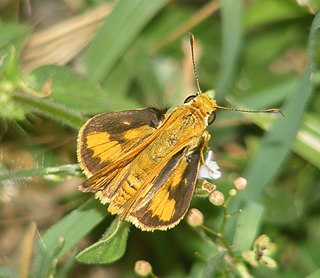
Telicota colon, commonly known as the pale palm dart or common palm dart, is a species of butterfly in the family Hesperiidae. It is found from India to Australia.

Appias libythea, the striped albatross, is a small butterfly of the family Pieridae, that is, the yellows and whites, which is found in south and southeast Asia.

Nephele hespera, the crepuscular hawkmoth, is a sphingid moth described by Johan Christian Fabricius in 1775.

Arhopala centaurus, the centaur oakblue or dull oakblue, is a species of lycaenid or blue butterfly found in India and southeast Asia to the Philippines.
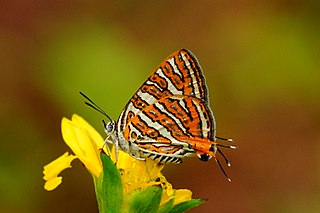
Cigaritis vulcanus, the common silverline, is a species of lycaenid or blue butterfly found in Asia. It was first described by Johan Christian Fabricius in 1775.

Mocis frugalis, the sugarcane looper, is a moth of the family Erebidae. The species was first described by Johan Christian Fabricius in 1775. It is found in several parts of the world, including India, Sri Lanka, West African countries and other Oriental regions. The adult is a fruit piercer and a major pest of crops.
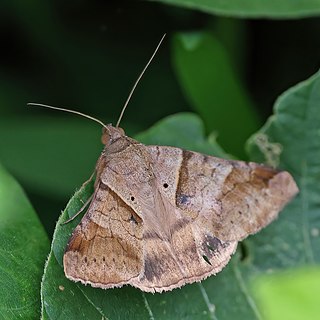
Mocis undata, the brown-striped semilooper, is a moth of the family Erebidae. The species was first described by Johan Christian Fabricius in 1775. It is found in the Afrotropical and Oriental regions, including India and Sri Lanka.

Ceryx is a genus of moths in the family Erebidae. It was described by Hans Daniel Johan Wallengren in 1863.

Thysanoplusia orichalcea, the slender burnished brass, is a moth of the family Noctuidae. The species was first described by Johan Christian Fabricius in 1775. It is a polyphagous pest of vegetable crops that originated in Indonesia, from where it spread to Europe, South Asia, India, Sri Lanka, Africa, Australia and New Zealand. In northern Europe it is a migrant species.
Anadevidia peponis is a species of moth belonging to the family Noctuidae. It is primarily found in Southeast Asia, including countries such as Japan, India, Taiwan, and the state of New South Wales in Australia. This moth is known to be a minor pest that affects various plants in the cucurbit family..
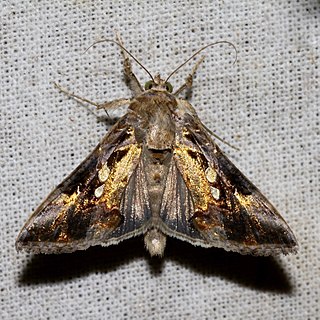
Argyrogramma signata, the green semilooper, is a moth of the family Noctuidae.

Speiredonia mutabilis is a species of moth of the family Erebidae first described by Johan Christian Fabricius in 1794. It is found in India, Sri Lanka, Vietnam, Taiwan, the Philippines, from Sundaland eastwards to Australia, the Solomon Islands, New Caledonia, Vanuatu, Fiji and Tonga.

Thyas coronata is a species of moth of the family Erebidae first described by Johan Christian Fabricius in 1775. It is found from the Indo-Australian tropics of southern China, Taiwan, Japan, Nepal, India, Sri Lanka to Micronesia and the Society Islands.
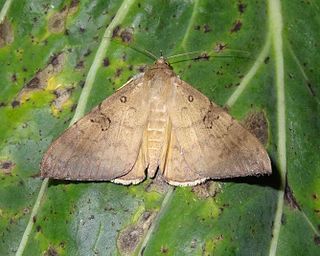
Oxyodes scrobiculata, the longan semi-looper or longan leaf-eating looper, is a moth of the family Erebidae. The common name "looper" is used despite looper moths generally being in the family Geometridae. The species was first described by Johan Christian Fabricius in 1775. It is found in the Indo-Australian tropics of India, Sri Lanka, Myanmar, China, Taiwan, east to Guam, Queensland, New Caledonia, Fiji, Samoa and Tonga.

Asota caricae, the tropical tiger moth, is a species of noctuoid moth in the family Erebidae. It is found from the Indo-Australian tropics of India and Sri Lanka to Queensland and Vanuatu.

Asota ficus is a moth in the family Erebidae first described by Johan Christian Fabricius in 1775. It is found in Afghanistan, Bangladesh, China, Taiwan, India, Indonesia (Sumatra), Laos, Myanmar, Nepal, Pakistan, Sri Lanka, Thailand and northern Vietnam.
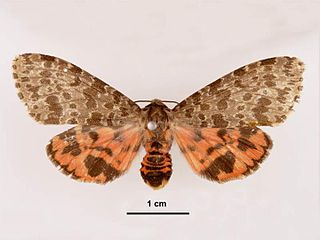
Olepa ricini is a moth of the family Erebidae first described by Johan Christian Fabricius in 1775. It is found in Bangladesh, India, Nepal, and Sri Lanka. An older treatment placed the species in the genus Pericallia.

Amyna punctum is a moth of the family Noctuidae first described by Johan Christian Fabricius in 1794. This moth can be found throughout subtropical African countries such as South Africa, Madagascar and Australasian countries like India, Sri Lanka, the Philippines, Borneo and the Andaman Islands.



















